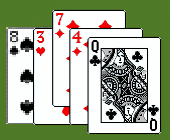Copyright
- Cards and deal
- Shuffle the cards and divide them equally among the players. If any are left over just leave them out of play. You each hold your quota of cards face down in a pile.
- Setting the target.
- Cards will be played face up in a row, overlapping to save space, called the equator. Dealer starts it by playing their top card face up. If it's a face card (K, Q, J), replace it with the next, and so on till the start card is a numeral. Next in turn does likewise until a numeral appears. These two cards set the two-figure target to be reached. For example, if they are and Eight and a Three, the target is 83.
- Play.
- You each in turn take the top card of your pile and place it to the right of the target number
to continue the equator. If it's a face card, count it as the same as the nearest numeral to its left. Everybody
then has the chance to make an equation that equals the target. The equation must include -
- The two cards forming the target, and
- The last card played to the equator,
- And any, all or none of the intervening cards.
 if the equator is 8-3-7-4-Q, and if you allow powers and roots, you could consider them as 4^3+8+7+4=83.
If powers and roots are not allowed, and the next card played is a Two, you can make (8x3x4)-7-4-2=83.
If anyone makes a correct equation, they win the two start cards (here 8 and 3) and discard the remainder to a wastepile. If anyone makes an incorrect equation, they are debarred from making any further attempts at matching the current target number - or, in a two-player game, their opponent automatically wins the two start cards and discards the rest of the equator. If nobody makes a correct equation, whoever played the last card calls for the next in turn to add a card to the row.
if the equator is 8-3-7-4-Q, and if you allow powers and roots, you could consider them as 4^3+8+7+4=83.
If powers and roots are not allowed, and the next card played is a Two, you can make (8x3x4)-7-4-2=83.
If anyone makes a correct equation, they win the two start cards (here 8 and 3) and discard the remainder to a wastepile. If anyone makes an incorrect equation, they are debarred from making any further attempts at matching the current target number - or, in a two-player game, their opponent automatically wins the two start cards and discards the rest of the equator. If nobody makes a correct equation, whoever played the last card calls for the next in turn to add a card to the row. - Ending and winning.
- Play continues until not enough cards are available to create a two-figure target number and add at least one card to continue the equator. Everybody then scores the number of cards they have won. Or, if preferred and agreed, their total face value.
- Variant.
- Instead of finishing at that point, you can turn the cards of the discard pile face down, deal them out, and continue the game until not enough remain for even this.
- Footnote
- On average it will take four or five cards, occasionally six, to complete an equation. But it can be done in as few as two - for if the first two cards are 25 you can immediately equate to 5^2=25.
- Related games or puzzles
- I can't imagine anyone wanting to play the following variant as a competitive game,
but it makes an interesting puzzle or solitaire.
From the top of the pack deal the first three numeral cards face up and then set a target by multiplying the highest by the lowest of them and subtracting the other numeral if the product is over 30 or adding it if the product is 30 or less. (This is to ensure that the target number is not excessively high or low.) Suppose the first three numerals are 5-8-4, then the target is 4x8-5=27.Now turn the next numeral card and try to construct the same target using all five cards. Suppose it is another 5. Then from 5-8-4-5 you can make 5x5+(8/4)=27. Keep adding one more numeral card (counting a face card as the same as previous numeral, or simply skipping it) and repeating the process as far as you can. I just started a series that continued as follows:
4-8-4-5-4: (4x8)-4-((5-4)^4)=27
4-8-4-5-4-9: (9x5)-(4x5)+(8/4)=27
And so on, until you really would prefer to sit and watch paint dry.Footnote You might want to skip Aces as well as face cards, since if an Ace turns up you can always repeat the previous equation and multiply it by one.If you like equation games, see also Brain Drain, One Up, and Prime Time